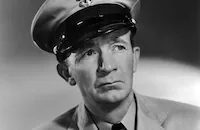Centennial Summer
Brief Synopsis
Cast & Crew
Otto Preminger
Jeanne Crain
Cornel Wilde
Linda Darnell
William Eythe
Walter Brennan
Film Details
Technical Specs

Synopsis
In 1876, Philadelphia is celebrating the birth of the United States with the opening of the Centennial Exposition. Jesse Rogers, his wife Harriet and four children, older daughters, Julia and Edith, and two younger children, Susanna and Dudley, hope to attend several of the events, but their plans are threatened when Jesse spends the family savings on an invention. Jesse, who works for a railroad company, is designing a collection of clocks which indicate all the different time zones and intends to present his invention to the railroad's president, Mr. Trowbridge, as an aid to running the company more efficiently. The family receives an urgent carrier letter from Aunt Zenia, Harriet's sister, announcing that she is coming from France to visit. Zenia, whom Jesse meets for the first time at the railroad station, is accompanied by her nephew Philippe, who is in charge of the French government's pavilion at the Exposition. While waiting for her father outside railroad superintendent Snodgrass' office, Julia overhears Snodgrass criticizing Jesse for bypassing him and trying to ship his clock invention directly to Trowbridge. Snodgrass then demotes Jesse to the night shift. Later, Jesse tells Harriet that he has deliberately changed his work schedule in order to accompany the family and guests to the Exposition. While there, they all visit the French pavilion, which is in great disarray and not yet open. As Philippe is distraught, Julia, who like Edith is attracted to him, speaks French and offers to work for him. Meanwhile, Zenia realizes that the family is putting up a front and intends to find a way to help them. Edith, who wants to see the world rather than settle down and marry Benjamin Franklin Phelps, the obstetrician who is courting her, visits Philippe and attempts to arouse his interest in her and tells him that Ben is Julia's fiancé. Later, when Philippe invites Edith out for the evening, Julia and Ben try to recover their respective sweethearts and go to the same restaurant. Julia then asks Ben to accompany Philippe and Edith to the theater, while she goes to the railroad yard to talk over the family's fortunes with her father. Julia offers Jesse her salary, but he declines her help and, realizing that she is in love with Philippe, suggests that she no longer accept a salary from him. Meanwhile, Zenia begins romancing Trowbridge. After Philippe reminisces with Julia about "his" Paris, she suggests that the pavilion be redesigned to reflect more of the spirit of France. Philippe agrees and, a week later, the pavilion is ready to open with a formal ball. Philippe still thinks that Julia is engaged to Ben and therefore is not romantic with her, which prompts Julia to tell Edith that she has won the Frenchman's heart. The next evening, Edith plays hostess at the opening of the pavilion. At the ball, Zenia introduces Jesse to Trowbridge. Zenia, who has been promoting Jesse as a brilliant inventor/entrepreneur, advises him on how to handle negotiations for the purchase of his ideas. Suspecting that Zenia is trying to seduce Jesse, Harriet leaves the ball and returns home. Jesse is dining with Trowbridge when Snodgrass shows up and reveals that he is one of Trowbridge's minor employees. After Jesse leaves in embarrassment, Philippe tells Edith that he is in love with Julia, and she admits that Ben is in love with her. However, the heartbroken Julia has left town to spend some time at her grandmother's, so when Philippe cannot find her, he and Jesse get drunk together. Jesse finally reveals Julia's whereabouts. After Snodgrass finds Jesse drunk on the job, he fires him. Julia and Philippe eventually get together, and Edith decides to revive Ben's interest, and goes to see him at his office. Assuming that she has come on a professional visit as a result of her involvement with Philippe, Ben offers to marry her and she accepts. Harriet and Zenia then have a squabble over Jesse. Later that day, Jesse and the entire Rogers family go to the train station to see Zenia off. Snodgrass approaches Jesse and apologizes, saying that Trowbridge has told him that the company intends to buy his invention and hire him to perfect it. All this appears to have been engineered by Zenia, whose new beau, Trowbridge, is waiting on board the train to accompany her to her next destination.

Director

Otto Preminger
Cast

Jeanne Crain

Cornel Wilde

Linda Darnell

William Eythe

Walter Brennan

Constance Bennett

Dorothy Gish

Barbara Whiting
Larry Stevens
Kathleen Howard
Buddy Swan

Charles Dingle
Avon Long
Florida Sanders

Gavin Gordon
Eddie Dunn
Lois Austin
Harry Strang
Frances Morris
Reginald Sheffield
William Frambes
Paul Everton
James Metcalfe
John Farrell
Billy Wayne
Robert Malcolm
Edna Holland
Ferris Taylor
Winifred Harris
Clancy Cooper
Bud Fine
Peter Conrad
Alexander Sacha
Roger Neury
Perc Launders
Sam Mcdaniel
Nicodemus Stewart
Fred "snowflake" Toones
Napoleon Whiting
Rodney Bell
Joe Whitehead
Hans Moebus
Alex Melesh
Max Willenz
Bruce Bristol
William Forrest Jr.
Crew
Charles Althouse
Don Anderson
Gene Bryant
W. D. Flick
Dorothy Fox
Lee Fuller
Sol Halprin
Edwin Hammeras
Oscar Hammerstein Ii
E. Y. Harburg
Roger Heman
Charles Henderson
Robert Hill
Lou Ann Hogan
Renè Hubert
Arthur Jacobson
Natalie Kalmus
Michael Kanin
Jerome Kern
Gertrude Kingston
Thomas Little
Arthur Morton
Richard Mueller
Paul Neal
Alfred Newman
Ben Nye
Tom Odegard
Maurice De Packh
Ernest Palmer
Otto Preminger
Harry Reynolds
Frances C. Richardson
Leo Robin
Conrad Salinger
Fred Sersen
Edward Snyder
Herbert Spencer
Murray Spivack
Jack Virgil
Lyle Wheeler
Darryl F. Zanuck

Film Details
Technical Specs

Award Nominations
Best Score
Best Song
Quotes
Trivia
Notes
The film's title card reads, "Jerome Kern's Centennial Summer." When Twentieth Century-Fox purchased the rights to Albert E. Idell's best seller in 1943, it apparently did not intend to make the property as a musical, as indicated by early 1944 screenplays in the Twentieth Century-Fox Produced Scripts Collection at the UCLA Arts-Special Collections Library. By late 1944, however, the project had been turned into a musical. According to documents in the Jerome Kern file of the Twentieth Century-Fox Records of the Legal Department, also located at UCLA, Kern was contracted in late January 1945 to supply the music for ten songs for $100,000. With Kern's approval, Leo Robin was engaged to write lyrics. Robin's fee was $40,000. According to a modern source, friction developed between Robin and Kern, because the lyricist was taking too much time. Both Oscar Hammerstein II and E. Y. Harburg were subsequently assigned to contribute lyrics to keep the project on schedule. One song written for the film, "Duettino," was not used, but was later published as "Two Hearts Are Better Than One," with lyrics credited to Robin. However, studio documents credit Johnny Mercer with the song's lyrics. Alfred Newman received an Academy Award for Best Scoring of a Musical Picture for Centennial Summer, and "All Through the Day" won the Academy Award for Best Song. While the film was still shooting, Kern died of a cerebral hemorrhage on November 11, 1945. Avon Long, who performs the "Cinderella Sue" number, had previously appeared in Kern's Broadway production, Very Warm for May.












